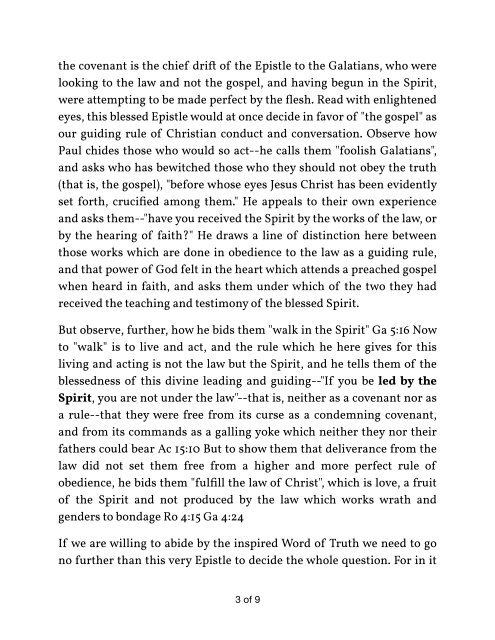Create successful ePaper yourself
Turn your PDF publications into a flip-book with our unique Google optimized e-Paper software.
<strong>the</strong> covenant is <strong>the</strong> chief drift of <strong>the</strong> Epistle to <strong>the</strong> Galatians, who were<br />
looking to <strong>the</strong> law and not <strong>the</strong> gospel, and having begun in <strong>the</strong> Spirit,<br />
were attempting to be made perfect by <strong>the</strong> flesh. Read with enlightened<br />
eyes, this blessed Epistle would at once decide in favor of "<strong>the</strong> gospel" as<br />
our guiding rule of <strong>Christ</strong>ian conduct and conversation. Observe how<br />
Paul chides those who would so act--he calls <strong>the</strong>m "foolish Galatians",<br />
and asks who has bewitched those who <strong>the</strong>y should not obey <strong>the</strong> truth<br />
(that is, <strong>the</strong> gospel), "before whose eyes Jesus <strong>Christ</strong> has been evidently<br />
set forth, crucified among <strong>the</strong>m." He appeals to <strong>the</strong>ir own experience<br />
and asks <strong>the</strong>m--"have you received <strong>the</strong> Spirit by <strong>the</strong> works of <strong>the</strong> law, or<br />
by <strong>the</strong> hearing of faith?" He draws a line of distinction here between<br />
those works which are done in obedience to <strong>the</strong> law as a guiding rule,<br />
and that power of God felt in <strong>the</strong> heart which attends a preached gospel<br />
when heard in faith, and asks <strong>the</strong>m under which of <strong>the</strong> two <strong>the</strong>y had<br />
received <strong>the</strong> teaching and testimony of <strong>the</strong> blessed Spirit.<br />
But observe, fur<strong>the</strong>r, how he bids <strong>the</strong>m "walk in <strong>the</strong> Spirit" Ga 5:16 Now<br />
to "walk" is to live and act, and <strong>the</strong> rule which he here gives for this<br />
living and acting is not <strong>the</strong> law but <strong>the</strong> Spirit, and he tells <strong>the</strong>m of <strong>the</strong><br />
blessedness of this divine leading and guiding--"If you be led by <strong>the</strong><br />
Spirit, you are not under <strong>the</strong> law"--that is, nei<strong>the</strong>r as a covenant nor as<br />
a rule--that <strong>the</strong>y were free from its curse as a condemning covenant,<br />
and from its commands as a galling yoke which nei<strong>the</strong>r <strong>the</strong>y nor <strong>the</strong>ir<br />
fa<strong>the</strong>rs could bear Ac 15:10 But to show <strong>the</strong>m that deliverance from <strong>the</strong><br />
law did not set <strong>the</strong>m free from a higher and more perfect rule of<br />
obedience, he bids <strong>the</strong>m "fulfill <strong>the</strong> law of <strong>Christ</strong>", which is love, a fruit<br />
of <strong>the</strong> Spirit and not produced by <strong>the</strong> law which works wrath and<br />
genders to bondage Ro 4:15 Ga 4:24<br />
If we are willing to abide by <strong>the</strong> inspired Word of Truth we need to go<br />
no fur<strong>the</strong>r than this very Epistle to decide <strong>the</strong> whole question. For in it<br />
3 of 9

















